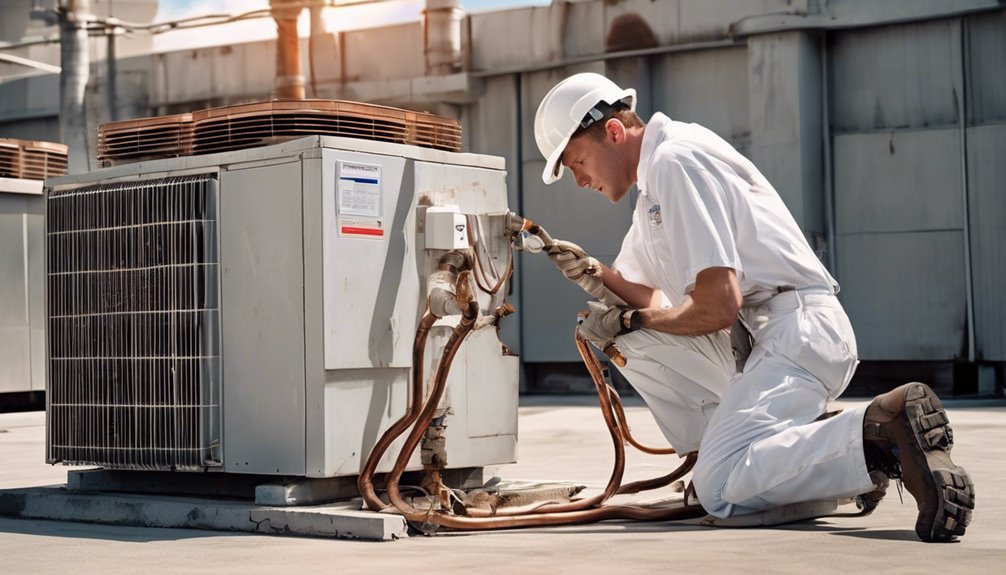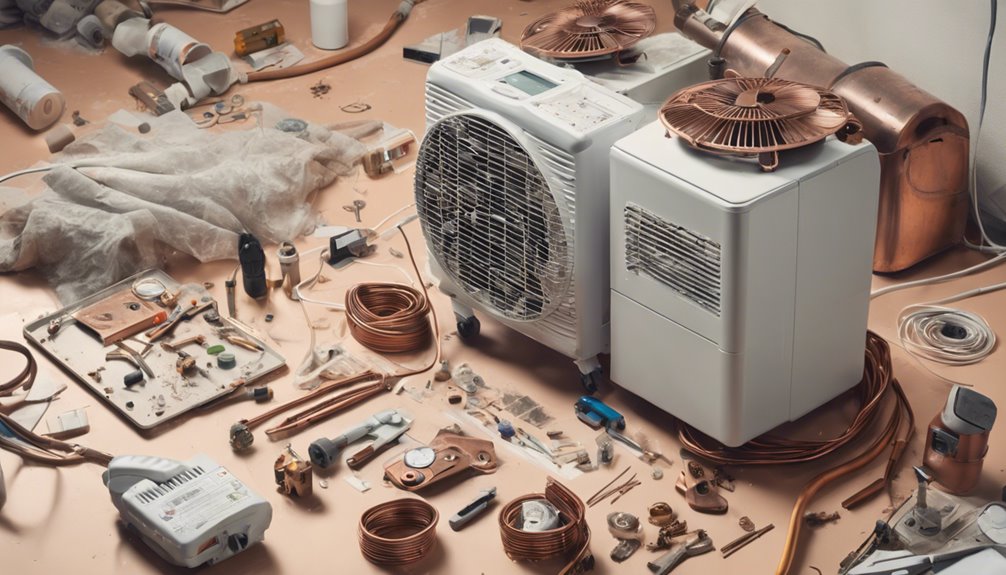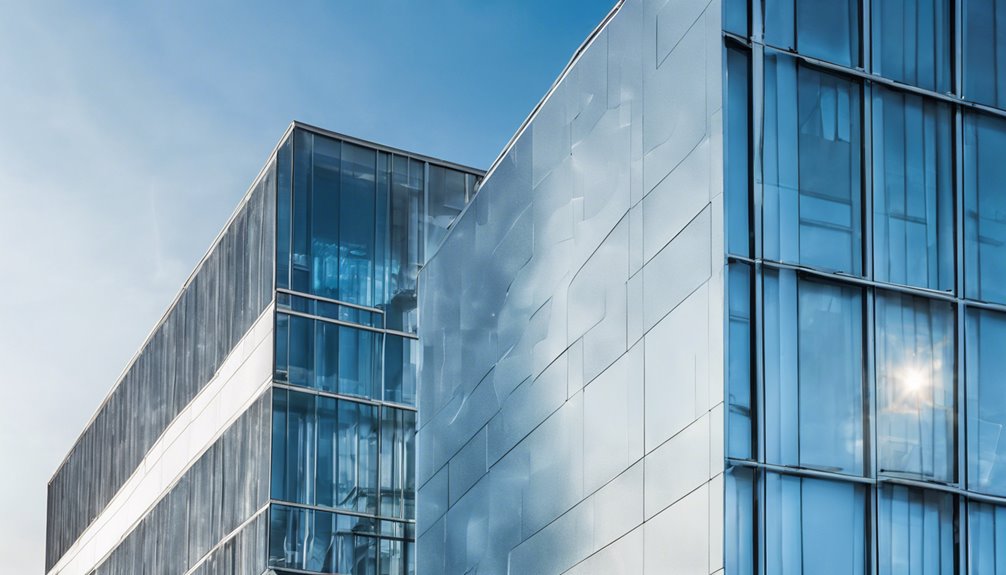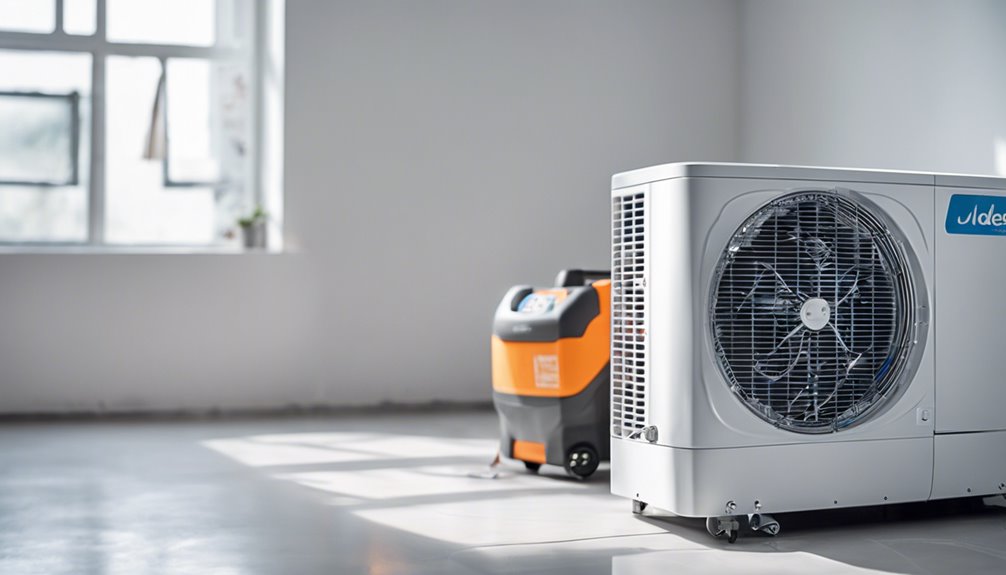When it comes to maintaining a comfortable and productive work environment, a well-functioning commercial AC system is essential, as it directly impacts your business's bottom line, employee health, and overall performance. Neglecting regular maintenance can lead to sudden breakdowns, decreased productivity, and even health issues among employees. By staying on top of routine tune-ups, you can prevent costly repairs, optimize system performance, and even reduce your environmental footprint. Keep exploring to discover the benefits of customized commercial AC services tailored to your unique business needs.
Key Takeaways
- Regular commercial AC maintenance ensures healthier employees, reduces energy bills, and prevents costly repairs and replacements.
- Proper system design, installation, and component selection are crucial for optimal performance, energy efficiency, and indoor air quality.
- Preventative maintenance identifies and addresses minor issues before they become major problems, reducing downtime and repair costs.
- A reliable commercial AC service provider should have a strong commercial history, transparent pricing, and experience with similar projects.
- Energy-efficient systems and regular tune-ups can lead to substantial energy savings and a reduced environmental footprint.
Importance of Commercial AC Maintenance
Regular maintenance of your commercial air conditioning system is crucial to ensure it operates efficiently and effectively.
You can't afford to neglect it, as it directly impacts your business's bottom line. Poor air quality, which can result from a neglected AC system, can lead to health issues and decreased productivity among your employees.
This, in turn, affects your business productivity. When your AC system is well-maintained, you'll notice a significant difference in the air quality, and your employees will be healthier and more focused.
Don't wait until your system breaks down and costs you more in repairs or even replacements. Stay on top of maintenance to ensure your commercial AC system runs smoothly and efficiently.
Benefits of Regular AC Tune-Ups
By committing to regular AC tune-ups, you'll reap a range of benefits that directly impact your bottom line.
For starters, you can expect your system to last longer, reducing the need for costly replacements. Additionally, tune-ups will help your AC run more efficiently, lowering your energy bills, and minimizing the risk of sudden breakdowns.
Extended System Lifespan
Your air conditioner's lifespan is directly tied to how well you maintain it.
Regular tune-ups can significantly extend its lifespan, saving you from costly replacements and downtime. By cleaning or replacing air filters, you're not only improving air quality but also reducing the strain on your AC's components.
This simple task can add years to your system's life. Additionally, tune-ups help identify and address minor issues before they become major problems, further prolonging your AC's lifespan.
Improved Energy Efficiency
As you extend the life of your air conditioner, you'll also notice a significant impact on your energy bills.
Regular tune-ups optimize your system's performance, ensuring it runs efficiently and effectively. This means you'll consume less energy, resulting in lower bills.
By leveraging advanced cooling technologies, you can maximize your energy savings. Consider conducting energy audits to identify areas of improvement and opportunities to upgrade your system.
With a well-maintained air conditioner, you'll not only reduce your energy consumption but also minimize your environmental footprint. By taking proactive steps to improve your system's energy efficiency, you'll reap long-term benefits that go beyond just cost savings.
Reduced Breakdown Risks
When it comes to avoiding costly repairs, regular AC tune-ups are instrumental in identifying potential issues before they spiral out of control.
By investing in routine maintenance, you'll reduce the risk of unexpected breakdowns and minimize downtime. This proactive approach allows for a thorough risk assessment, ensuring that potential problems are addressed before they become major issues.
- Regular AC tune-ups help detect and repair worn or damaged components, reducing the likelihood of system failure.
- System optimization is achieved through tune-ups, ensuring your AC operates at peak performance and efficiency.
- By addressing minor issues early on, you'll avoid the financial burden of costly repairs and replacements down the line.
Common AC Issues in Commercial Settings
As you manage your commercial property, you're likely to encounter some common AC issues that can disrupt your business operations.
You may notice ice buildup and leaks, which can lead to water damage and mold growth, or experience electrical and sensor issues that cause your AC system to malfunction.
Ice Buildup and Leaks
Ice buildup and leaks are two of the most common issues plaguing commercial air conditioning systems.
You've probably experienced the frustration of a malfunctioning AC unit, especially during peak summer months.
Ice buildup occurs when the condenser coils freeze, blocking airflow and causing the system to work harder, increasing energy bills.
Leaks, on the other hand, can lead to water damage, mold growth, and further system damage.
- Frozen coils can be prevented with regular Condenser cleaning to ensure proper airflow and heat transfer.
- Leaks can be detected early by monitoring the system's pressure and refrigerant levels.
- Regular maintenance can help identify and address these issues before they escalate into costly repairs.
Electrical and Sensor Issues
Faulty electrical connections and malfunctioning sensors can cripple your commercial air conditioning system, leading to inefficient performance, increased energy consumption, and even system breakdowns.
You may not even realize that faulty connections are causing your AC to work harder, driving up your energy bills. Meanwhile, malfunctioning sensors can prevent your system from functioning at its optimal level.
Regular sensor calibration is crucial to ensure your AC is running smoothly. If you neglect these issues, you'll be stuck with a system that's not only inefficient but also prone to frequent breakdowns.
Energy Efficiency and Cost Savings
Your commercial air conditioning system is one of the largest consumers of energy in your building, accounting for a significant portion of your utility bills.
By optimizing its performance, you can enjoy substantial commercial benefits and reduce your energy expenses.
An energy audit can help identify areas of improvement, such as:
- Inefficient compressor operation
- Leaky ducts and inadequate insulation
- Incorrect thermostat settings and zoning issues
AC System Design and Installation
When it comes to designing and installing a commercial AC system, you need to get it right from the start.
You'll want to ensure the system is properly sized and loaded, that the ductwork is expertly designed and laid out, and that the equipment is selected and placed for optimal performance.
System Sizing and Load
Proper system sizing and load calculation are crucial steps in AC system design and installation.
You'll want to ensure your system can handle the cooling demands of your commercial space. A system that's too small won't provide adequate cooling, while an oversized system will waste energy and increase costs.
When determining system sizing and load, consider the following factors:
- Cooling capacity: Calculate the total heat gain in your space, including factors like occupancy, lighting, and equipment.
- System configuration: Consider the type and number of units, as well as the ductwork and ventilation systems.
- Building characteristics: Take into account the building's insulation, windows, and orientation to maximize energy efficiency.
Ductwork Design and Layout
A well-designed ductwork system is critical to the overall performance of your commercial AC system, as it directly affects airflow, energy efficiency, and indoor air quality.
You need a ductwork design that ensures proper air flow to each zone, without restrictions or leaks. A poorly designed duct system can lead to reduced air flow, increased energy consumption, and poor indoor air quality.
To achieve optimal performance, you should consider duct optimization techniques, such as sizing ducts correctly, minimizing bends and turns, and using high-quality sealing materials.
A well-optimized duct system will help you maximize your commercial AC system's performance, reduce energy costs, and create a healthier indoor environment.
Equipment Selection and Placement
Selecting the right commercial AC equipment and placing it strategically is crucial to your system's overall performance and efficiency.
When choosing equipment, consider factors like the size of your building, the number of occupants, and the type of activities taking place. This will ensure you get the right capacity and type of equipment for your needs.
To optimize your equipment selection and placement, consider the following:
- Conduct an Airflow Analysis to determine the most effective airflow patterns and identify potential bottlenecks.
- Implement Zoning Strategies to divide your building into separate areas with independent temperature control, increasing efficiency and reducing energy waste.
- Consider the physical constraints of your building, such as available space and accessibility, when placing equipment to ensure easy maintenance and repair.
Repair vs. Replacement: Knowing When to Upgrade
When your commercial air conditioning unit starts acting up, you're faced with a crucial decision: repair or replace?
This choice isn't just about getting your AC up and running; it's about making a cost-effective decision for your business.
A thorough cost analysis can help you determine whether repair or replacement is the better option.
Consider your budget constraints and weigh the costs of frequent repairs against the upfront cost of a new unit.
If your AC is old or has been repaired multiple times, it might be time to upgrade.
Newer units are often more energy-efficient, which can lead to long-term savings.
Commercial AC System Components and Functions
You've made the decision to repair or replace your commercial air conditioning unit, but do you know how it actually works?
Understanding the components and functions of your commercial AC system is crucial to ensuring it operates efficiently and effectively.
- The compressor is responsible for compressing refrigerant, which allows heat to be transferred from the building to the outside air.
- The air handler and ductwork work together to circulate cooled air throughout the building, maintaining a consistent air quality and temperature.
- The thermostat regulates the cooling capacity, ensuring the system produces the right amount of cool air to meet your building's specific needs.
How to Choose the Right Commercial AC Provider
Three key factors will determine the success of your commercial air conditioning project: the quality of the equipment, the expertise of the installation team, and the reliability of the provider.
You want a provider with a strong commercial history, indicating they've handled projects similar to yours. Check their provider reputation online, asking for referrals and reading reviews to ensure they're reliable and responsive.
Don't be afraid to ask about their experience with commercial AC systems like yours. A reputable provider will be transparent about their services, pricing, and warranties.
Preventative Maintenance for Commercial AC Systems
Now that you've found a reliable commercial AC provider, it's time to think about the long-term health of your system.
Preventative maintenance is crucial to ensure your commercial AC system runs efficiently and effectively.
Regular maintenance helps maintain good air quality, which is essential for the health and comfort of your employees and customers.
It also prevents system failures, which can lead to costly repairs and downtime.
- Regular cleaning and replacement of filters to ensure optimal airflow and air quality
- Scheduling routine inspections to identify and address potential issues before they become major problems
- Ensuring system integration with other building systems, such as lighting and HVAC, to optimize energy efficiency and performance
Customized AC Solutions for Unique Businesses
Every business is unique, with its own set of requirements and challenges.
Your business needs a customized AC solution that addresses its specific cooling needs. That's where we come in – our team of experts will work with you to understand your business needs and design a tailored cooling system that meets your unique requirements.
We offer a range of cooling options to suit your business, from rooftop units to split systems and everything in between.
Our goal is to provide a system that not only keeps your employees and customers comfortable but also helps you save energy and reduce costs. With our customized AC solutions, you can focus on what matters most – growing your business.
Frequently Asked Questions
Can I Repair My AC Unit Myself to Save Money?
You can try fixing your AC unit yourself, but be aware of DIY limitations – you might not have the necessary expertise, and repair risks include electrical shock, refrigerant leaks, and further system damage, potentially costing more in the long run.
How Long Does a Typical Commercial AC System Last?
When you're on a roll, you expect your AC system to keep pace, but its lifespan depends on system design and maintenance schedules. Typically, a well-maintained system lasts 15-20 years, but neglect can cut its life short by half.
What Is the Average Cost of Commercial AC Installation?
When you're installing a new AC system, you'll face a significant upfront cost, ranging from $3,000 to $15,000 or more, depending on system sizing and equipment selection, which can greatly impact the final price tag.
Do I Need a Permit to Install a New Commercial AC?
Did you know that 40% of businesses fail to obtain necessary permits, resulting in costly rework? When installing a new AC, you'll likely need a permit, as permit requirements and installation regulations vary by state and local governments, so it's essential to check with yours.
Can I Use a Residential AC Unit in a Commercial Setting?
You can't simply use a residential AC unit in a commercial setting, as it may not meet building codes and zoning regulations, which demand more robust systems to ensure safety and efficiency in commercial spaces.
Conclusion
As you flip the switch, your commercial AC system roars to life, a modern-day beast tamed to keep your business cool and comfortable. But don't be fooled – without regular maintenance, it can quickly turn into a fire-breathing monster, spewing inefficiency and costs. Stay ahead of the game with routine tune-ups, energy-efficient designs, and a trusted provider. By doing so, you'll be the master of your domain, reigning supreme over a cool, calm, and collected work environment.



